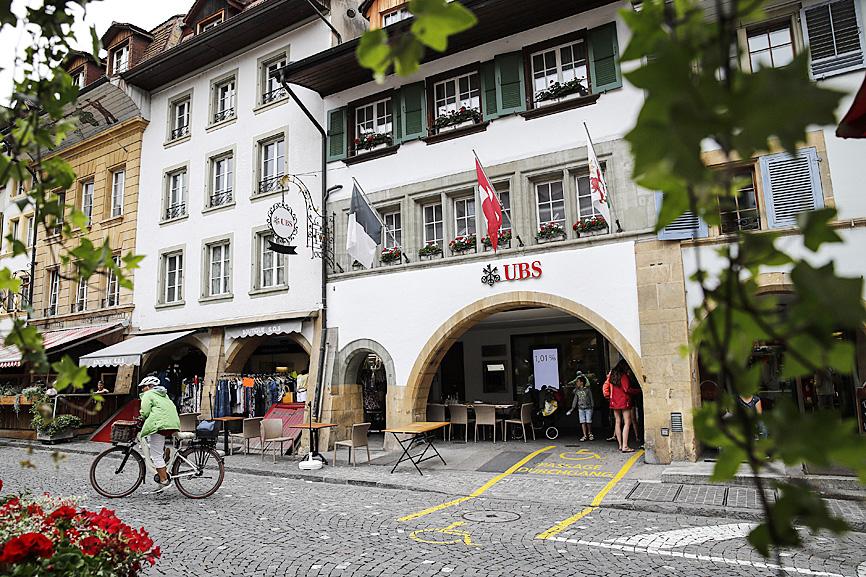UBS Group AG yesterday signaled that the worst hit of the COVID-19 pandemic on its balance sheet might be over, prompting the bank to consider reviving shareholder payouts after costs to cover soured loans peaked in the first half.
The Swiss bank — while warning there was plenty of uncertainty ahead — attracted US$9 billion of net new money at its private banking business in the second quarter and posted higher transaction-based income as clients boosted trading in volatile markets.
While credit loss expenses are to remain high in the coming months, they would not match the US$540 million posted in the first half, it said.

Photo: Bloomberg
UBS, which serves mostly wealthy clients and does not do a lot of corporate lending, has been relatively shielded from the defaults which prompted Wall Street firms to set aside tens of billions of dollars to cover an expected wave of bankruptcies.
At the same time, it also benefited from the trading bonanza that saw Wall Street firms post record profits — fixed-income trading revenue at the investment bank more than doubled.
The issue of dividend payments and buybacks has been controversial because of the relief that banks have received from regulators to help them withstand the crisis.
UBS and Credit Suisse Group AG were among the last European firms to delay their dividend after the Swiss regulator followed its European counterparts by pressuring lenders to suspend payouts because of the economic uncertainty.
UBS chief executive Sergio Ermotti said that he is now confident that the bank would pay the second tranche of its dividend in the second half. UBS stopped a US$450 million buyback program in March because of the pandemic.
The bank added US$272 million to its loan loss provisions during the second quarter, slightly below estimates, with Europe starting to reopen businesses.
The bank said that the majority of its credit exposures are of high quality, in part reflecting the wealth of its home nation.
The wealth unit, the bank’s largest contributor of revenue, said that net new money was positive across the regions.
Recurring net fee income declined 8 percent at the wealth management business, mostly reflecting lower invested assets at the beginning of the quarter.
Profit at the wealth unit was supported by a strong performance in Asia, which made up for a 37 percent drop in profit year-on-year for the business in the Americas.
Ermotti, who is to step down at the end of October, has scaled down trading after the financial crisis, though the bank still has a sizeable equities business.

UNCERTAINTY: Innolux activated a stringent supply chain management mechanism, as it did during the COVID-19 pandemic, to ensure optimal inventory levels for customers Flat-panel display makers AUO Corp (友達) and Innolux Corp (群創) yesterday said that about 12 to 20 percent of their display business is at risk of potential US tariffs and that they would relocate production or shipment destinations to mitigate the levies’ effects. US tariffs would have a direct impact of US$200 million on AUO’s revenue, company chairman Paul Peng (彭雙浪) told reporters on the sidelines of the Touch Taiwan trade show in Taipei yesterday. That would make up about 12 percent of the company’s overall revenue. To cope with the tariff uncertainty, AUO plans to allocate its production to manufacturing facilities in

TAKING STOCK: A Taiwanese cookware firm in Vietnam urged customers to assess inventory or place orders early so shipments can reach the US while tariffs are paused Taiwanese businesses in Vietnam are exploring alternatives after the White House imposed a 46 percent import duty on Vietnamese goods, following US President Donald Trump’s announcement of “reciprocal” tariffs on the US’ trading partners. Lo Shih-liang (羅世良), chairman of Brico Industry Co (裕茂工業), a Taiwanese company that manufactures cast iron cookware and stove components in Vietnam, said that more than 40 percent of his business was tied to the US market, describing the constant US policy shifts as an emotional roller coaster. “I work during the day and stay up all night watching the news. I’ve been following US news until 3am

Taiwan will prioritize the development of silicon photonics by taking advantage of its strength in the semiconductor industry to build another shield to protect the local economy, National Development Council (NDC) Minister Paul Liu (劉鏡清) said yesterday. Speaking at a meeting of the legislature’s Economics Committee, Liu said Taiwan already has the artificial intelligence (AI) industry as a shield, after the semiconductor industry, to safeguard the country, and is looking at new unique fields to build more economic shields. While Taiwan will further strengthen its existing shields, over the longer term, the country is determined to focus on such potential segments as

COLLABORATION: Given Taiwan’s key position in global supply chains, the US firm is discussing strategies with local partners and clients to deal with global uncertainties Advanced Micro Devices Inc (AMD) yesterday said it is meeting with local ecosystem partners, including Taiwan Semiconductor Manufacturing Co (TSMC, 台積電), to discuss strategies, including long-term manufacturing, to navigate uncertainties such as US tariffs, as Taiwan occupies an important position in global supply chains. AMD chief executive officer Lisa Su (蘇姿丰) told reporters that Taiwan is an important part of the chip designer’s ecosystem and she is discussing with partners and customers in Taiwan to forge strong collaborations on different areas during this critical period. AMD has just become the first artificial-intelligence (AI) server chip customer of TSMC to utilize its advanced